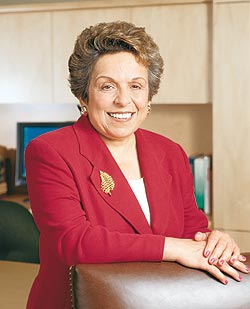
After serving eight years and becoming the longest serving HHS Secretary in U.S. history, Donna Shalala was selected as the University of Miami's president. Now NFL.com has chosen her to discuss what it's like presiding over the school that produces more NFL talent than any other
Know her from Adam: Donna Shalala
Adam Schefter By Adam Schefter
Special to NFL.com
(Nov. 8, 2004) -- In 1993, President Clinton appointed Donna Shalala as the U.S. Secretary of Health and Human Services. After serving eight years and becoming the longest serving HHS Secretary in U.S. history, Shalala was selected as the University of Miami's president. Now NFL.com has chosen her to discuss what it's like presiding over the school that produces more NFL talent than any other.
Adam Schefter: Who has a tougher job -- you or Dave Wannstedt?
NFL Network
NFL Network
NFL Network
Analysis, opinions, features and more!
Fantasy Football
Field Pass
Listen LIVE to NFL games, plus watch video news and features of your favorite team.
Donna Shalala: He does -- because he's losing. The University of Miami is winning. But the Dolphins are going to turn it around. I've got great faith in them. I love going to their games, and when I have time I do. But it's hard because we have our own weekends of football.
Schefter: As the woman whom the Washington Post called "one of the most successful government managers of modern times," what are the most important attributes of a successful manager or coach?
Shalala: That you learn how to listen and you identify priorities and you work with people you appointed and people you didn't appoint. You build teams. Teamwork is probably the most successful attribute of a great manager.
Schefter: What is it that you like so much about mountain climbing?
Shalala: I like taking risks, personally and professionally.
Schefter: Biggest risk you've ever taken?
Shalala: Firing the athletic director (Don Morton) and the football coach at the University of Wisconsin, and then hiring Barry Alvarez. Everybody in Wisconsin told me that the school never could be a football power again.
Schefter: What was it that you liked about Barry Alvarez?
Shalala: He was hungry, and he was well organized and very disciplined.
Schefter: How many football coaches did you interview?
Shalala: A lot. I had to spend a lot of time worrying about how to bring that program into pre-eminence. We had a huge deficit in the athletic department and it required fundamental change and I was hardly an expert on the subject. But on getting fundamental change in institutions I knew something about. So I figured if I could get the right leaders, we would be fine. The first thing I did was go after a new athletic director and I talked Pat Richter into taking the job. But mostly I got to know the former athletes. Elroy "Crazy Legs" Hirsch was a huge supporter of mine. He said, 'You do it, and I'll take care of the boys downtown.'
Schefter: What attributes do you look for in a football coach?
Shalala: High ethical standards, a very good manager, obviously a skilled coach, but someone who understands young people and is focused on their well being and on achieving excellence.
Schefter: How much do you know about football now?
Shalala: A lot more now than I did 20 years ago.
Schefter: To what do we credit that?
Shalala: I went to Wisconsin (as chancellor).
Schefter: And how much of an education have you gotten at Miami?
Shalala: When I came here, they were just about to hire a new coach. Butch Davis was leaving and Larry Coker was so obvious, and he was sitting there and I met him and I loved him. Football here is somewhat different, there is a culture here. So many of our players can come from the same areas. They know each other. But it's the same skill level. A well-organized coach committed to student-athletes, with high ethical standards, works hard at what he does and knows how to win.
Schefter: How often do you go to your school's games?
University of Miami President Donna Shalala knows a thing or two about success.
University of Miami President Donna Shalala knows a thing or two about success.
Shalala: I go to all of them. The out-of-town games, I often try to ride on the plane with the players. On those trips, everybody sleeps and I can read. Everybody thinks of these trips out as kind of rowdy affairs. They're just the opposite. The student-athletes are either listening to music or they're doing their homework, and the planes are very quiet, both going out and coming back.
Schefter: Best book you've read on a Miami football trip?
Shalala: That's an interesting question. I'm usually listening to books. I've listened to a couple of George Will books on baseball, and the new book on Jackie Robinson, which I thought was terrific. But right now, I'm listening to a book on Iran about their oil politics.
Schefter: How did Miami turn into the dominant football factory it is?
Shalala: Former players, same philosophy. You do your business, you take care of your academics, and you focus on getting your degree as well as excellence in athletics. But actually, they've created a culture here and they know what they need to do to get to the top.
Schefter: Favorite player to come through your school?
Shalala: I've had a lot of favorite players. I don't want to pick any out, but I had a good relationship with Joaquin Gonzalez of the Cleveland Browns. He's a very good student. I've always had good relationships with the student-athletes, women and men. I know a lot of them.
Schefter: How has the move to the ACC worked out for your school?
Shalala: It's going to be great, and it's going to be particularly great for our Olympic sports. I mean, women's soccer, women's tennis. All of those sports are just thrilled with the opportunity and particularly our track team. I saw Lauren Williams, who won silver at the Olympics, and she and her colleagues think it's a fabulous move for the university.
Schefter: As somebody born in Cleveland, were you a Browns fan?
Shalala: I was. But then I went to Syracuse, and I was there in the era of Larry Csonka and Floyd Little. But I actually didn't pay much attention to football until I went to Wisconsin. But this is what I really remember about Syracuse: It was cold.
Schefter: As a director of Gannett Co., Inc, how do you think the NFL Network will fare?
Shalala: Very well. This is a sports-conscious country and people are paying attention and increasingly using the Internet and radio, in addition to television, to get their sports information. People go to all sorts of sites to get their information, and I'm sure the NFL Network is going to do just fine.
Schefter: How would Condoleezza Rice fare as NFL commissioner?
Shalala: She'd be tough, very tough. She was tough as an academic, and she's tough as a government official.
Schefter: Your favorite memory of being the U.S. Secretary of Health and Human Services?
Shalala: A lot of high points in those years. I guess it was when we finally got the children in the United States immunized because it was very clear that we saved thousands of children from disease by getting them through the immunization process. That was a huge partnership to get that done.
Schefter: Toughest part of the job?
Shalala: Every part. I think working on trying to get healthcare for everybody. That was very complicated. The healthcare system is very complicated, and trying to get some progress was very difficult.
Schefter: Where is our healthcare system moving?
Shalala: It's either going to blow up or improve gradually.
Schefter: What would it take for it to blow up?
Shalala: That employers could no longer afford to provide healthcare for their employees because costs are going up so rapidly.
Schefter: The one story you remember about President Clinton?
Shalala: When the Badgers won the Rose Bowl, we had a Cabinet meeting two days later. And all he and Al Gore could talk about was the football game, detail by detail. They both had watched it.
Schefter: Did you say, 'Isn't it time to get down to business, men?'
Shalala: No, I told them the White House would be better off if it had a Division I team. And obviously the quarterback would be the president.





